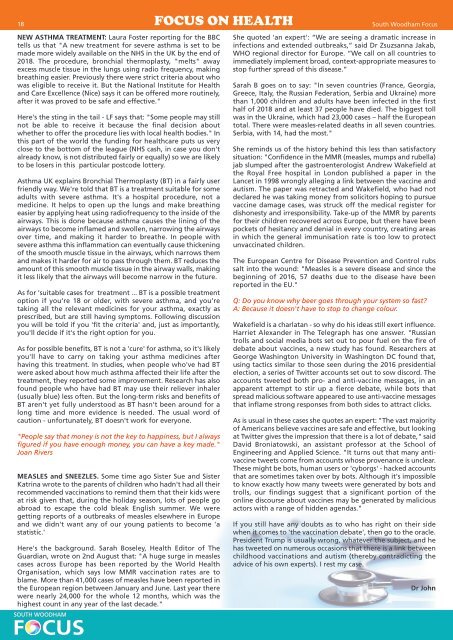868 FOCUS copy
You also want an ePaper? Increase the reach of your titles
YUMPU automatically turns print PDFs into web optimized ePapers that Google loves.
South 18 Woodham Focus<br />
South Woodham Focus<br />
NEW ASTHMA TREATMENT: Laura Foster reporting for the BBC<br />
tells us that "A new treatment for severe asthma is set to be<br />
made more widely available on the NHS in the UK by the end of<br />
2018. The procedure, bronchial thermoplasty, "melts" away<br />
excess muscle tissue in the lungs using radio frequency, making<br />
breathing easier. Previously there were strict criteria about who<br />
was eligible to receive it. But the National Institute for Health<br />
and Care Excellence (Nice) says it can be offered more routinely,<br />
after it was proved to be safe and effective."<br />
Here's the sting in the tail - LF says that: "Some people may still<br />
not be able to receive it because the final decision about<br />
whether to offer the procedure lies with local health bodies." In<br />
this part of the world the funding for healthcare puts us very<br />
close to the bottom of the league (NHS cash, in case you don't<br />
already know, is not distributed fairly or equally) so we are likely<br />
to be losers in this particular postcode lottery.<br />
Asthma UK explains Bronchial Thermoplasty (BT) in a fairly user<br />
friendly way. We're told that BT is a treatment suitable for some<br />
adults with severe asthma. It's a hospital procedure, not a<br />
medicine. It helps to open up the lungs and make breathing<br />
easier by applying heat using radiofrequency to the inside of the<br />
airways. This is done because asthma causes the lining of the<br />
airways to become inflamed and swollen, narrowing the airways<br />
over time, and making it harder to breathe. In people with<br />
severe asthma this inflammation can eventually cause thickening<br />
of the smooth muscle tissue in the airways, which narrows them<br />
and makes it harder for air to pass through them. BT reduces the<br />
amount of this smooth muscle tissue in the airway walls, making<br />
it less likely that the airways will become narrow in the future.<br />
As for 'suitable cases for treatment ... BT is a possible treatment<br />
option if you’re 18 or older, with severe asthma, and you’re<br />
taking all the relevant medicines for your asthma, exactly as<br />
prescribed, but are still having symptoms. Following discussion<br />
you will be told if you 'fit the criteria' and, just as importantly,<br />
you'll decide if it's the right option for you.<br />
As for possible benefits, BT is not a 'cure' for asthma, so it's likely<br />
you'll have to carry on taking your asthma medicines after<br />
having this treatment. In studies, when people who've had BT<br />
were asked about how much asthma affected their life after the<br />
treatment, they reported some improvement. Research has also<br />
found people who have had BT may use their reliever inhaler<br />
(usually blue) less often. But the long-term risks and benefits of<br />
BT aren't yet fully understood as BT hasn't been around for a<br />
long time and more evidence is needed. The usual word of<br />
caution - unfortunately, BT doesn't work for everyone.<br />
"People say that money is not the key to happiness, but I always<br />
figured if you have enough money, you can have a key made."<br />
Joan Rivers<br />
MEASLES and SNEEZLES. Some time ago Sister Sue and Sister<br />
Katrina wrote to the parents of children who hadn't had all their<br />
recommended vaccinations to remind them that their kids were<br />
at risk given that, during the holiday season, lots of people go<br />
abroad to escape the cold bleak English summer. We were<br />
getting reports of a outbreaks of measles elsewhere in Europe<br />
and we didn't want any of our young patients to become 'a<br />
statistic.'<br />
Here's the background. Sarah Boseley, Health Editor of The<br />
Guardian, wrote on 2nd August that: "A huge surge in measles<br />
cases across Europe has been reported by the World Health<br />
Organisation, which says low MMR vaccination rates are to<br />
blame. More than 41,000 cases of measles have been reported in<br />
the European region between January and June. Last year there<br />
were nearly 24,000 for the whole 12 months, which was the<br />
highest count in any year of the last decade."<br />
SOUTH WOODHAM<br />
<strong>FOCUS</strong><br />
<strong>FOCUS</strong> ON HEALTH<br />
She quoted 'an expert': “We are seeing a dramatic increase in<br />
infections and extended outbreaks,” said Dr Zsuzsanna Jakab,<br />
WHO regional director for Europe. “We call on all countries to<br />
immediately implement broad, context-appropriate measures to<br />
stop further spread of this disease.”<br />
Sarah B goes on to say: "In seven countries (France, Georgia,<br />
Greece, Italy, the Russian Federation, Serbia and Ukraine) more<br />
than 1,000 children and adults have been infected in the first<br />
half of 2018 and at least 37 people have died. The biggest toll<br />
was in the Ukraine, which had 23,000 cases – half the European<br />
total. There were measles-related deaths in all seven countries.<br />
Serbia, with 14, had the most."<br />
She reminds us of the history behind this less than satisfactory<br />
situation: "Confidence in the MMR (measles, mumps and rubella)<br />
jab slumped after the gastroenterologist Andrew Wakefield at<br />
the Royal Free hospital in London published a paper in the<br />
Lancet in 1998 wrongly alleging a link between the vaccine and<br />
autism. The paper was retracted and Wakefield, who had not<br />
declared he was taking money from solicitors hoping to pursue<br />
vaccine damage cases, was struck off the medical register for<br />
dishonesty and irresponsibility. Take-up of the MMR by parents<br />
for their children recovered across Europe, but there have been<br />
pockets of hesitancy and denial in every country, creating areas<br />
in which the general immunisation rate is too low to protect<br />
unvaccinated children.<br />
The European Centre for Disease Prevention and Control rubs<br />
salt into the wound: "Measles is a severe disease and since the<br />
beginning of 2016, 57 deaths due to the disease have been<br />
reported in the EU."<br />
Q: Do you know why beer goes through your system so fast?<br />
A: Because it doesn't have to stop to change colour.<br />
Wakefield is a charlatan - so why do his ideas still exert influence.<br />
Harriet Alexander in The Telegraph has one answer. "Russian<br />
trolls and social media bots set out to pour fuel on the fire of<br />
debate about vaccines, a new study has found. Researchers at<br />
George Washington University in Washington DC found that,<br />
using tactics similar to those seen during the 2016 presidential<br />
election, a series of Twitter accounts set out to sow discord. The<br />
accounts tweeted both pro- and anti-vaccine messages, in an<br />
apparent attempt to stir up a fierce debate, while bots that<br />
spread malicious software appeared to use anti-vaccine messages<br />
that inflame strong responses from both sides to attract clicks.<br />
As is usual in these cases she quotes an expert: "The vast majority<br />
of Americans believe vaccines are safe and effective, but looking<br />
at Twitter gives the impression that there is a lot of debate," said<br />
David Broniatowski, an assistant professor at the School of<br />
Engineering and Applied Science. "It turns out that many antivaccine<br />
tweets come from accounts whose provenance is unclear.<br />
These might be bots, human users or 'cyborgs' - hacked accounts<br />
that are sometimes taken over by bots. Although it's impossible<br />
to know exactly how many tweets were generated by bots and<br />
trolls, our findings suggest that a significant portion of the<br />
online discourse about vaccines may be generated by malicious<br />
actors with a range of hidden agendas."<br />
If you still have any doubts as to who has right on their side<br />
when it comes to 'the vaccination debate', then go to the oracle.<br />
President Trump is usually wrong, whatever the subject, and he<br />
has tweeted on numerous occasions that there is a link between<br />
childhood vaccinations and autism (thereby contradicting the<br />
advice of his own experts). I rest my case.<br />
Dr John


















